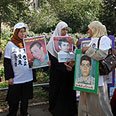
Families of killed
צילום: גיל יוחנן
Oct. 2000 victims' families: Deal won't make up for loss
Eleven out of 13 families of those killed in October 2000 riots receive compensation from state, but say it is not an answer to their loss, not end of the road for them. Government says it will pay, but not take responsibility. Families: This sounds like a bad joke
The severance payment agreement between the State and the families of the victims of the October 2000 riots, approved by the Nazareth District Court on Thursday, did little to satisfy the families of those killed during the events that coincided with the beginning of the second intifada.
Most of the families were reluctant to comment on the issue, and those who did said that the agreement, which was forged between them and the State to compensate them for their loss, does not give them any consolation.
Bahajat Hamaisa, whose brother was killed in Kfar Qana, told Ynet: "Nobody can bring our sons back to us and nobody can compensate for the pain. The agreement to pay us is just a step on the way."
The families, which have already made a claim for the severance in September 2005, have refused to disclose the amount of the compensation. "The amount we were promised by the prime minister at the time of Ehud Barak was higher, but back then we did not think it was the right thing to do," said Ibrahim Siam whose son was killed in the riots.
In a statement regarding the payment agreement, the Justice Ministry emphasized that the government has agreed to pay the families of the victims, although it does not consider itself responsible in principle for the damages caused as a result of the events.
'State shooting itself in the foot'
"I have never heard such a bad joke," Siam said. "Do you know anyone who will agree to pay for something he is not responsible for? They are shooting themselves in the foot.""The purpose of the claim is not money. All we want is to uncover the truth and to get our hands on those who murdered our loved ones, and the compensation agreement is just a step on the way to that," Siam said.
He also referred to the two families (out of the 13) who refused to sign the agreement: "They refused and the reasons are with them, but we have remained one family that is fighting for the same thing, which is to bring the murderers to justice."
People close to the two families explained they refused to sign the agreement because they consider the events as murder and refuse to receive money for the blood of their sons. "In case the killers are not brought to justice there is a plan to appeal to the international criminal court in The Hague," they added.
The 13 victims were killed during a wave of violent protests of Israeli Arabs which erupted in October of 2000 in conjunction with the beginning of the al-Aqsa uprisings and lasted a week. In addition, one Jewish man was killed in the riots. The riots are seen as one of the most important events which have shaped the relations between Israeli Arabs and government institutions. The riots also triggered the formation of the Or Commission which investigated the functioning of the police during the riots and the way they were investigated.










